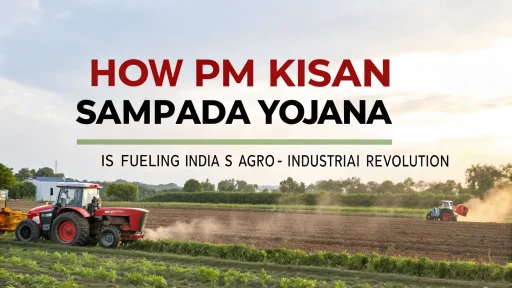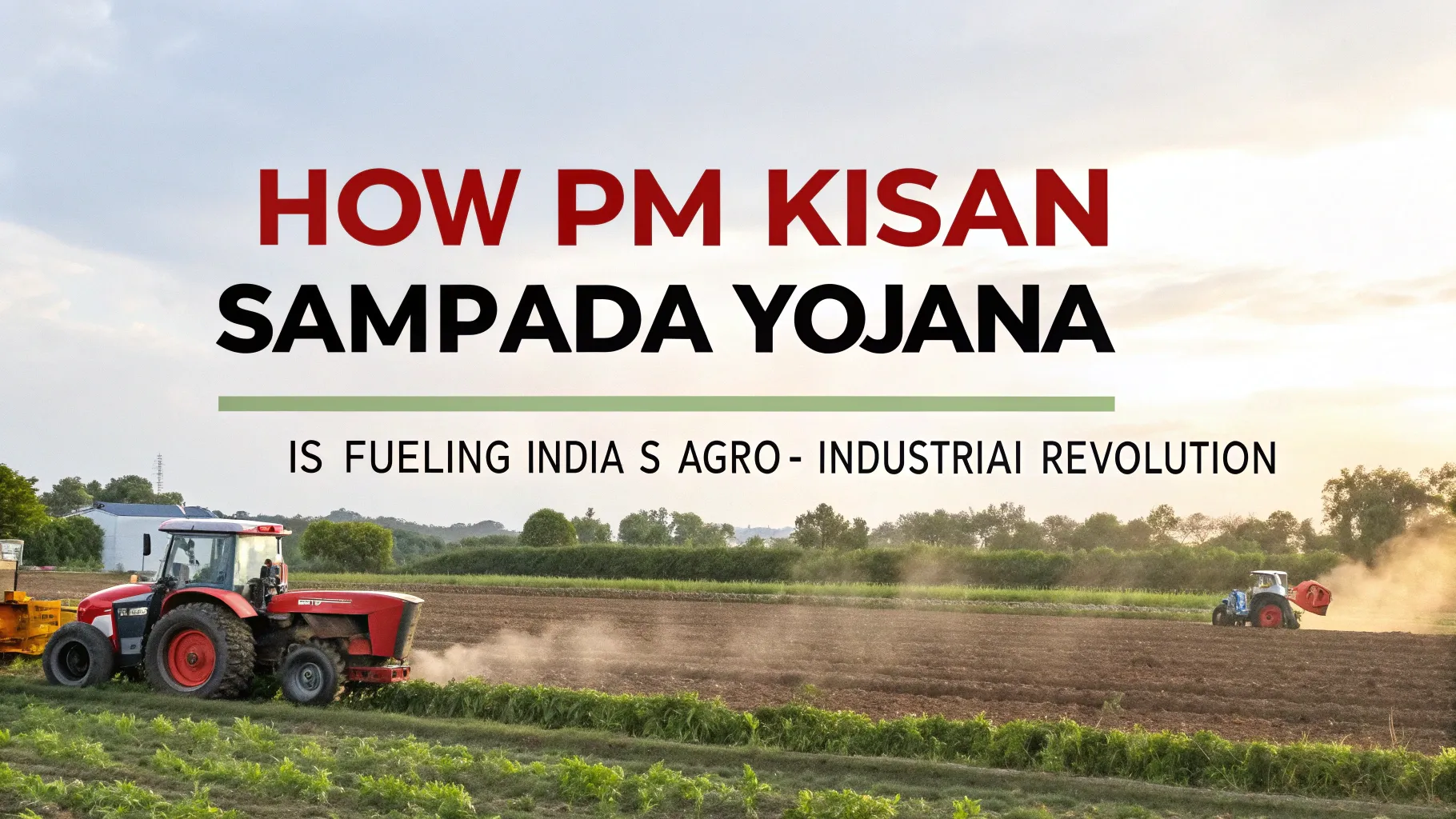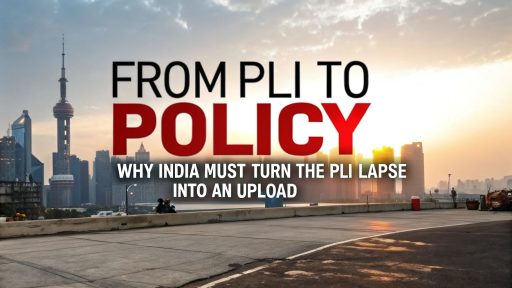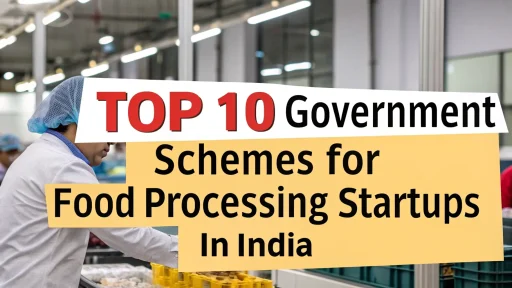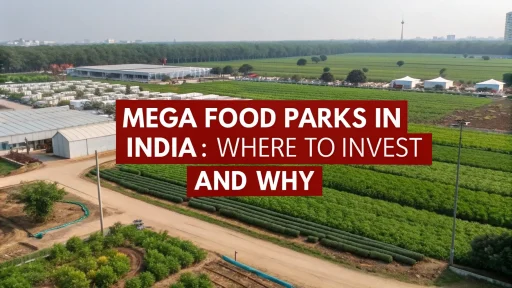India’s agricultural economy has undergone significant changes in the past decade. This change is characterized by the move from farming to value-added processing of food products and agri-business. A major step toward this shift is the PM Kisan SAMPADA Yojana (PMKSY) initiated by the Ministry of Food Processing Industries (MoFPI). As of 2023-24, the food processing sector has been growing consistently at a rate of 5.35% per annum which contributed 7.66% towards the GVA in manufacturing and 8.45% towards the GVA in agriculture (MoFPI Annual Report, 2023-24).
Overview of PM Kisan SAMPADA Yojana
- Launch Year: 2017
- Ministry: Ministry of Food Processing Industries (MoFPI)
- Aim: To modernize infrastructure, reduce wastage of food, enhance capacity for processing, and integrate agriculture with market interface.
Components of PM Kisan SAMPADA Yojana
PMKSY is an umbrella scheme integrating several sub-schemes:
Mega Food Parks
Facilitates a cluster-based approach to integrate agriculture with the market through a network of producer-marketer-retailer linkage.
Integrated Cold Chain and Value Addition Infrastructure
Support includes construction of cold storage, reefer vans, IQF lines and value addition units.
Creation/Expansion of Food Processing & Preservation Capacities (CEFPPC)
Promotes growth of food processing units and enhances their capabilities.
Backward and Forward Linkages
Improves the supply chain network for perishable agro-horticultural products.
Agro Processing Cluster Scheme
Encourages cluster-based economic growth in rural and semi-urban regions.
Operation Greens
Concentrated on value and supply chain management for perishables as well as market stabilization.
Food Testing Laboratories
Ensures compliance with food safety and regulatory requirements.
Funding and Support
- As of 2023-24, more than 800 funded projects across various sub-schemes have been initiated.
- 41 mega food parks have been approved.
- Annual Budget Allocation: Approx ₹1,500 crores for 2023-24
- Grants Available: 35% to 75% of project costs based on geographical factors.
Related: The Agriculture Sector in India
Impact on Agro-Industrial Growth
Infrastructure Development
The PM Kisan SAMPADA Yojana scheme has greatly aided in the development of:
- Modern storage and processing facilities
- Refrigerated cold chain logistics, including ripening chambers
- Advanced food testing laboratories
Employment Creation
- As of 2021-2022, employment statistics in the registered food processing sector stands at 20.68 million.
- In the unincorporated sector, there are 51.11 million workers.
- Total employment attributed to food processing is over 71.79 million.
Value Addition along with Waste Reduction
Initiatives under PMKSY have aided in reducing post-harvest losses by improving storage facilities, therefore enhancing shelf-life.
These schemes help farmers and agri-entrepreneurs increase their income by encouraging them to adopt value addition through processing.
Chart 1: Employment in Food Processing Sector
[Insert Bar Chart: Registered vs Unregistered Employment (2021-22)]
Market Demand and Forecast
According to MoFPI data:
- Exports from Food Sector (2023-24): US$ 46.43 billion
- Share of Processed Foods in Exports: 23.4%
- India’s Share in Global Food Export (2022): 2.55%
The food processing sector is projected to exceed $535 billion by 2027, growing at a CAGR of over 5%. PMKSY provides the necessary policy and financial infrastructure that acts as a growth catalyst.
State-Wise Impact
States such as Andhra Pradesh, Tamil Nadu, Telangana, and Maharashtra have seen notable employment, sectoral, and infrastructural advancements due to PMKSY projects. Andhra Pradesh alone has 13.28% of India’s registered food factories.
Table 1: Leading States with Food Processing Units
| State | % India Share of FPI Units |
| Andhra Pradesh | 13.28% |
| Tamil Nadu | 12% |
| Telangana | 8.75% |
| Punjab | 7.85% |
| Maharashtra | 6.57% |
PMKSY Addressed Issues
- Lack of Upgrading Infrastructure With Supply Chain Concerns
- Shrinking and Volatile Prices of Perishable Goods
- Insufficient Level of Processing of Fruits And Vegetables
- Absence of Designated Testing Centers for Food Products
Case Study: Telangana Mega Food Park
Telangana Mega Food Park has integrated more than 15 processing units and provided jobs to over 5000 people. It has also built cold storage facilities, research labs, and pack houses, thus, demonstrating the real benefits of the scheme.
Strategic Outlook for Entrepreneurs
In relation to PMKSY, for new startups and MSMEs, there is available:
- Support for capital subsidy along with land acquisition
- Support from PMAs (Project Management Agencies) for technical help
- Modern R&D, labs, and logistical services
Conclusion
It is evident that PMKSY is not merely a subsidy-based scheme. Rather, it is a comprehensive policy framework that aims to steer India towards an era of accelerated agro-industrial development. It provides entrepreneurship, stimulates farmer incomes, and strengthens supply chains. There is considerable opportunity for investment in food processing due to the large anticipated market growth for the coming years while aligning with PMKSY.
About Niir Project Consultancy Services (NPCS)
As one of Market Survey cum Tecno Economic Feasibility Report providers, Niir Project Consultancy Services (NPCS) also integrates manufacturing processes with necessary raw materials, plant layouts, and financials. NPCS aids entrepreneurs in determining the viability of establishing new industries or businesses.

